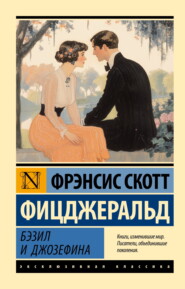По всем вопросам обращайтесь на: info@litportal.ru
(©) 2003-2024.
✖
Загадочная история Бенджамина Баттона / The Curious Case of Benjamin Button
Год написания книги
2020
Теги
Настройки чтения
Размер шрифта
Высота строк
Поля
Загадочная история Бенджамина Баттона / The Curious Case of Benjamin Button
Francis Scott Key Fitzgerald
Карманное чтение на английском языке
История американской и мировой литературы невозможна без упоминания имени Фрэнсиса Скотта Фицджеральда; его произведения признаны мировой классикой. В романах автора нашел свое отражение так называемый «век джаза»—период в истории Америки с момента окончания Первой мировой войны и до начала Великой депрессии 30-х годов. В данную книгу вошли три произведения Фицджеральда: «Загадочная история Бенджамина Баттона», «Хрустальная чаша» и роман «Ночь нежна».
Текст произведений сокращен и незначительно адаптирован для уровня 4 (для продолжающих учить английский язык верхней ступени), снабжен комментариями и словарем.
Фрэнсис Скотт Фицджеральд / F. Scott Fitzgerald
Загадочная история Бенджамина Баттона / The Curious Case of Benjamin Button
© Глушенкова Е.В., адаптация текста
© Прокофьева О.Н., адаптация текста, коммент. и словарь
© ООО «Издательство АСТ»
The Curious Case of Benjamin Button
by F. Scott Fitzgerald
In 1860 it was proper to be born at home. Now, so I am told, children are usually born in fashionable hospitals. So young Mr. and Mrs. Roger Button were fifty years ahead of style when they decided that their first baby should be born in a hospital. Whether it played any role in the astonishing story I am about to tell we will never know.
I shall tell you what happened, and let you judge for yourself.
The Roger Buttons held a high position, both social and financial, in Baltimore. This was their first baby—Mr. Button was naturally nervous. He hoped it would be a boy[1 - He hoped it would be a boy—Он надеялся, это будет мальчик] so that he could be sent to Yale College in Connecticut, the institution to which Mr. Button himself had been once sent.
On that September morning he got up at six o’clock, dressed himself, and hurried to the hospital. When he was approximately a hundred yards from the Maryland Private Hospital for Ladies and Gentlemen he saw Doctor Keene, the family physician, descending the front steps, rubbing his hands together as all doctors do by the unwritten ethics of their profession.
Mr. Roger Button, the president of Roger Button & Co., Wholesale Hardware, began to run toward Doctor Keene. “Doctor Keene!” he called.
The doctor heard him, turned around, and stood waiting, with a curious expression on his harsh, medicinal face.
“What happened?” demanded Mr. Button, as he came up in a rush. “How is she? A boy? Who is it?” Doctor Keene seemed somewhat irritated.
“Is the child born?” begged Mr. Button.
Doctor Keene frowned. “Why, yes, I suppose so…”
“Is my wife all right?”
“Yes.”
“Is it a boy or a girl?”
“I’ll ask you to go and see for yourself!” Then he turned away muttering: “Do you imagine a case like this will help my professional reputation? One more would ruin me—ruin anybody.”
“What’s the matter? Triplets?[2 - What’s the matter? Triplets?—В чем дело? Тройня?]” “No, not triplets! You can go and see for yourself. And get another doctor. I’m through with you! I don’t want to see you or any of your relatives ever again! Goodbye!”
Without another word he climbed into his carriage and drove away.
Mr. Button stood there trembling from head to foot[3 - trembling from head to foot—дрожа от головы до ног]. He had suddenly lost all desire to go into the Maryland Private Hospital for Ladies and Gentlemen—it was with the greatest difficulty that, a moment later, he forced himself to mount the steps and enter the front door.
A nurse was sitting behind a desk in the hall. Swallowing his shame, Mr. Button approached her.
“Good-morning. I—I am Mr. Button.”
A look of terror spread over the girl’s face.
“I want to see my child,” said Mr. Button.
The nurse gave a little scream. “Oh—of course!” she cried hysterically. “Upstairs. Right upstairs. Go up!”
She pointed the direction, and Mr. Button began to mount to the second floor. In the upper hall he addressed another nurse who approached him. “I’m Mr. Button,” he managed to say. “I want to see my—”
“All right, Mr. Button,” she agreed in a hushed voice. “Very well! But the hospital will never have the ghost of its reputation after—”
“Hurry! I can’t stand this!” “Come this way Mr. Button.”
He went after her. At the end of a long hall they reached a room. They entered. Ranged around the walls were half a dozen rolling cribs.
“Well,” gasped Mr. Button, “which is mine?”
“There!” said the nurse.
Mr. Button’s eyes followed her pointing finger, and this is what he saw. Wrapped in a white blanket, in one of the cribs, there sat an old man apparently about seventy years old. His sparse hair was almost white[4 - his sparse hair was almost white—его редкие волосы были почти белыми], and he had a long smoke-coloured beard. He looked up at Mr. Button with a question in his eyes.
“Is this a hospital joke?
“It doesn’t seem like a joke to us,” replied the nurse. “And that is most certainly your child.”
Mr. Button’s closed his eyes, and then, opening them, looked again. There was no mistake—he was gazing at a man of seventy—a baby of seventy, a baby whose feet hung over the sides of the crib.
The old man suddenly spoke in a cracked voice. “Are you my father?” he demanded. “Because if you are,” went on the old man, “I wish you’d get me out of this place…”
“Who are you?”
“I can’t tell you exactly who I am, because I’ve only been born a few hours—but my last name is certainly Button.”
“You lie!”
The old man turned wearily to the nurse. “Nice way to welcome a new-born child,” he complained in a weak voice. “Tell him he’s wrong, why don’t you?”
“You’re wrong. Mr. Button,” said the nurse. “This is your child. We’re going to ask you to take him home with you as soon as possible.” “Home?” repeated Mr. Button. “Yes, we can’t have him here. We really can’t, you know?”
Mr. Button sank down upon a chair near his son and put his face in his hands. “My heavens!” he murmured, in horror. “What will people say? What must I do?”
“You’ll have to take him home,” insisted the nurse—“immediately!”
Francis Scott Key Fitzgerald
Карманное чтение на английском языке
История американской и мировой литературы невозможна без упоминания имени Фрэнсиса Скотта Фицджеральда; его произведения признаны мировой классикой. В романах автора нашел свое отражение так называемый «век джаза»—период в истории Америки с момента окончания Первой мировой войны и до начала Великой депрессии 30-х годов. В данную книгу вошли три произведения Фицджеральда: «Загадочная история Бенджамина Баттона», «Хрустальная чаша» и роман «Ночь нежна».
Текст произведений сокращен и незначительно адаптирован для уровня 4 (для продолжающих учить английский язык верхней ступени), снабжен комментариями и словарем.
Фрэнсис Скотт Фицджеральд / F. Scott Fitzgerald
Загадочная история Бенджамина Баттона / The Curious Case of Benjamin Button
© Глушенкова Е.В., адаптация текста
© Прокофьева О.Н., адаптация текста, коммент. и словарь
© ООО «Издательство АСТ»
The Curious Case of Benjamin Button
by F. Scott Fitzgerald
In 1860 it was proper to be born at home. Now, so I am told, children are usually born in fashionable hospitals. So young Mr. and Mrs. Roger Button were fifty years ahead of style when they decided that their first baby should be born in a hospital. Whether it played any role in the astonishing story I am about to tell we will never know.
I shall tell you what happened, and let you judge for yourself.
The Roger Buttons held a high position, both social and financial, in Baltimore. This was their first baby—Mr. Button was naturally nervous. He hoped it would be a boy[1 - He hoped it would be a boy—Он надеялся, это будет мальчик] so that he could be sent to Yale College in Connecticut, the institution to which Mr. Button himself had been once sent.
On that September morning he got up at six o’clock, dressed himself, and hurried to the hospital. When he was approximately a hundred yards from the Maryland Private Hospital for Ladies and Gentlemen he saw Doctor Keene, the family physician, descending the front steps, rubbing his hands together as all doctors do by the unwritten ethics of their profession.
Mr. Roger Button, the president of Roger Button & Co., Wholesale Hardware, began to run toward Doctor Keene. “Doctor Keene!” he called.
The doctor heard him, turned around, and stood waiting, with a curious expression on his harsh, medicinal face.
“What happened?” demanded Mr. Button, as he came up in a rush. “How is she? A boy? Who is it?” Doctor Keene seemed somewhat irritated.
“Is the child born?” begged Mr. Button.
Doctor Keene frowned. “Why, yes, I suppose so…”
“Is my wife all right?”
“Yes.”
“Is it a boy or a girl?”
“I’ll ask you to go and see for yourself!” Then he turned away muttering: “Do you imagine a case like this will help my professional reputation? One more would ruin me—ruin anybody.”
“What’s the matter? Triplets?[2 - What’s the matter? Triplets?—В чем дело? Тройня?]” “No, not triplets! You can go and see for yourself. And get another doctor. I’m through with you! I don’t want to see you or any of your relatives ever again! Goodbye!”
Without another word he climbed into his carriage and drove away.
Mr. Button stood there trembling from head to foot[3 - trembling from head to foot—дрожа от головы до ног]. He had suddenly lost all desire to go into the Maryland Private Hospital for Ladies and Gentlemen—it was with the greatest difficulty that, a moment later, he forced himself to mount the steps and enter the front door.
A nurse was sitting behind a desk in the hall. Swallowing his shame, Mr. Button approached her.
“Good-morning. I—I am Mr. Button.”
A look of terror spread over the girl’s face.
“I want to see my child,” said Mr. Button.
The nurse gave a little scream. “Oh—of course!” she cried hysterically. “Upstairs. Right upstairs. Go up!”
She pointed the direction, and Mr. Button began to mount to the second floor. In the upper hall he addressed another nurse who approached him. “I’m Mr. Button,” he managed to say. “I want to see my—”
“All right, Mr. Button,” she agreed in a hushed voice. “Very well! But the hospital will never have the ghost of its reputation after—”
“Hurry! I can’t stand this!” “Come this way Mr. Button.”
He went after her. At the end of a long hall they reached a room. They entered. Ranged around the walls were half a dozen rolling cribs.
“Well,” gasped Mr. Button, “which is mine?”
“There!” said the nurse.
Mr. Button’s eyes followed her pointing finger, and this is what he saw. Wrapped in a white blanket, in one of the cribs, there sat an old man apparently about seventy years old. His sparse hair was almost white[4 - his sparse hair was almost white—его редкие волосы были почти белыми], and he had a long smoke-coloured beard. He looked up at Mr. Button with a question in his eyes.
“Is this a hospital joke?
“It doesn’t seem like a joke to us,” replied the nurse. “And that is most certainly your child.”
Mr. Button’s closed his eyes, and then, opening them, looked again. There was no mistake—he was gazing at a man of seventy—a baby of seventy, a baby whose feet hung over the sides of the crib.
The old man suddenly spoke in a cracked voice. “Are you my father?” he demanded. “Because if you are,” went on the old man, “I wish you’d get me out of this place…”
“Who are you?”
“I can’t tell you exactly who I am, because I’ve only been born a few hours—but my last name is certainly Button.”
“You lie!”
The old man turned wearily to the nurse. “Nice way to welcome a new-born child,” he complained in a weak voice. “Tell him he’s wrong, why don’t you?”
“You’re wrong. Mr. Button,” said the nurse. “This is your child. We’re going to ask you to take him home with you as soon as possible.” “Home?” repeated Mr. Button. “Yes, we can’t have him here. We really can’t, you know?”
Mr. Button sank down upon a chair near his son and put his face in his hands. “My heavens!” he murmured, in horror. “What will people say? What must I do?”
“You’ll have to take him home,” insisted the nurse—“immediately!”

















